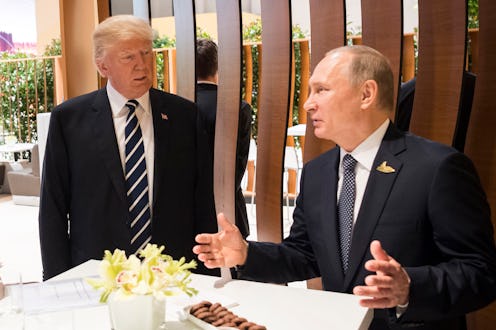News
Here's What Putin Said He Told Trump About Russian Election Interference

Friday saw the first meeting between President Trump and President Putin at the G20 Summit in Hamburg, Germany, and the two world leaders came out of it with conflicting outcomes from their discussion. In a press conference on Saturday, Putin made things even more confusing. He asserted that Trump accepted his denial that Russia meddled in the 2016 election, but told reporters they should "ask" Trump themselves.
In the press conference, Putin also brushed off questions about whether he had any intentions to interfere in Germany's coming elections, saying Moscow and Berlin have good relations, despite German officials airing concerns that they will. And he confirmed that the U.S. and Russia planned on setting up a joint cyber-security working group, agreeing with U.S. Secretary of State Rex Tillerson that both leaders wanted to move on from the issue.
Putin's suggestion at the press conference cause even confusion for a simple reason: Trump has not scheduled a similar press conference with the American press. Reporters don't have the opportunity to ask Trump about what happened at the meeting the way Russian reporters asked Putin. Similarly, immediately after the bilateral meeting, Russian foreign minister Sergey Lavrov held an on-camera briefing immediately, while Tillerson gave an audio statement.
It seems clear that — despite comments by both Putin and Tillerson expressing a desire to move on — there are questions regarding President Trump's acceptance of the intelligence community's assessment that Russia interfered in the 2016 election.
Shortly after Putin's press conference, United Nations Ambassador Nikki Haley was asked on Face The Nation about the president's potential response to Russian actions, and said "I think you're going to have to ask the president."
When Trump was asked about Russian interference on Thursday, one day before he met with Putin, he expressed his doubts, saying, "Nobody really knows for sure" — this despite essentially unanimous agreement from U.S. intelligence officials.
When former Director of National Intelligence James Clapper was asked about Trump's claims that other countries besides Russia could have been involved, he asserted that no evidence has shown that anyone else was.
Numerous commentators have blasted Trump's handling of his meeting with Putin, saying that he gave Putin PR victories without getting anything substantive in return. But without the Trump administration speaking to the press in the same way that Putin did, reporters and observers have been left without any ability to interpret the events independently.